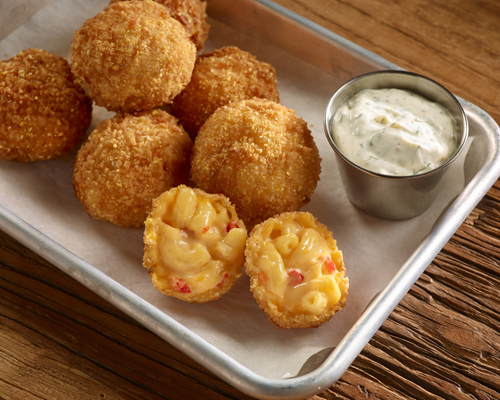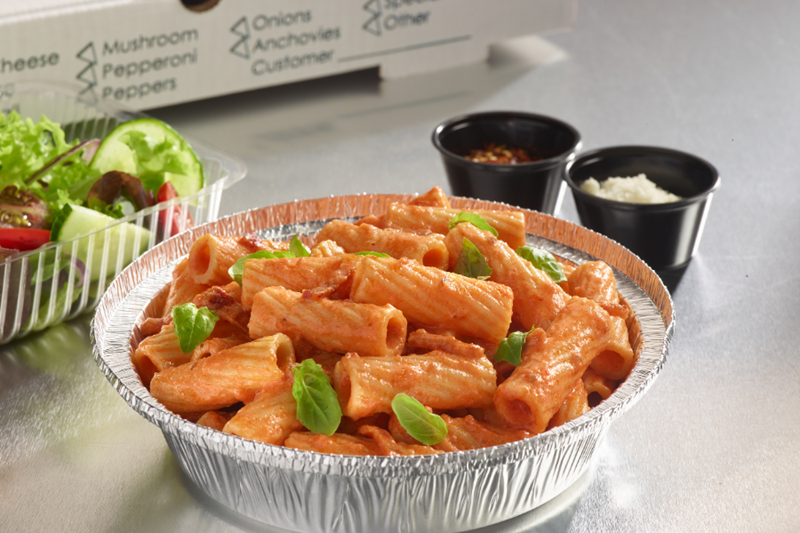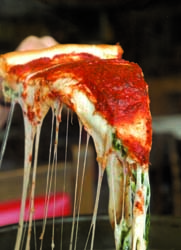 The sandy shores of Pensacola Beach, Florida, yield a plethora of dining options ranging from shaved ice shacks to Zagat-rated dining rooms. Seated comfortably in the middle is Hopjacks Pizza Kitchen & Taproom. But this two-unit company, owned by partners Corey Fogarty and Joe Abston, isn’t just your average pizzeria. Here, you’ll find traditional pub fare combined with upscale creations, live music and more beer selections than you should probably try. It’s all part of Hopsjacks kitsch, and that’s what keeps its varied clientele coming back for more.
The sandy shores of Pensacola Beach, Florida, yield a plethora of dining options ranging from shaved ice shacks to Zagat-rated dining rooms. Seated comfortably in the middle is Hopjacks Pizza Kitchen & Taproom. But this two-unit company, owned by partners Corey Fogarty and Joe Abston, isn’t just your average pizzeria. Here, you’ll find traditional pub fare combined with upscale creations, live music and more beer selections than you should probably try. It’s all part of Hopsjacks kitsch, and that’s what keeps its varied clientele coming back for more.
 Fogarty and Abston had been friends for a couple of years before kicking around the idea of opening a restaurant together. Initially, they began formulating a high-end concept utilizing Abston’s gourmet background. But through a series of discussions over coffee, that evolved into a much different formula.
Fogarty and Abston had been friends for a couple of years before kicking around the idea of opening a restaurant together. Initially, they began formulating a high-end concept utilizing Abston’s gourmet background. But through a series of discussions over coffee, that evolved into a much different formula.
“I said, ‘Dude, you’re a five-star chef. You don’t think you can make some awesome pizza?” says Fogarty, likening Abston’s reaction to “dominos falling” as the initial concept took form.
To save money, they purchased used equipment including an antiquated deck oven which at the same time was intentional. “It was a good thing for us,” says Fogarty. “Joe and I, we wanted to look like we’d been around, because we’ve been around in the restaurant business. Everybody we’ve hired has been in the restaurant business. The concept hadn’t, but we wanted people to feel comfortable when they walked in the door.”
 Although they could have replaced them, the scarred tables and chairs that accompanied the purchase of the restaurant remain, and they’re just getting ready to replace the well-worn carpeting. “We didn’t get in the way of our own good ideas,” Abston says. The 96-year-old building location had previously been a Mexican restaurant on one side and a jewelry store on the other (complete with safe that still remains on property). They simply busted through the wall, left the beams and headers, used the stunning jewelry cases as their bar and ripped off five layers of materials to reveal an original brick wall.
Although they could have replaced them, the scarred tables and chairs that accompanied the purchase of the restaurant remain, and they’re just getting ready to replace the well-worn carpeting. “We didn’t get in the way of our own good ideas,” Abston says. The 96-year-old building location had previously been a Mexican restaurant on one side and a jewelry store on the other (complete with safe that still remains on property). They simply busted through the wall, left the beams and headers, used the stunning jewelry cases as their bar and ripped off five layers of materials to reveal an original brick wall.
The Pensacola location has a large center counter that invites communal dining, and as the company expands, they hope new locations will lend themselves to that structural feature.
Two years later, Hopjacks seems to be on to something. The company was on DRAFT Magazine’s 150 Best Bars of 2009 list, and it has won nearly 10 local accolades as well. The Pensacola location offers 36 beers on tap and more than 150 by the bottle. The beer menu changes daily, and they even soak their own fruits for cocktail infusions.
“We’re primarily pizza, but we take my background, which is primarily snotty, high-end restaurants and turn that into pizza,” says Abston. (Pizza accounts for 37 percent of Hopjacks’ business.)

One of the restaurants’ signature offerings are its Belgian fries. Abston takes fresh-cut potatoes, fries them in duck fat and serves with ketchup and a roasted garlic herb dip. And yes, we said duck fat. “Between the two stores, we’re doing about 900 pounds of potatoes a week now,” he says.
How does Hopjacks manage to keep costs down with such a high-end ingredient? The key to a successful menu, says Abston, is to avoid menuing items that compete with one another and allow ingredients to go further. Abston says they render their own duck meat, use it elsewhere on their menu (such as the Roasted Duck Caesar Salad and the Herb Roasted Duck specialty pizza) and then use the fat for the fries. It’s economical because they’re able to stretch out the ingredient beyond one dish.
Hopjacks’ top-selling pizza is its Butcher Block, which is piled high with smoked bacon, seared filet mignon and pepperoni. It carries the tagline: “This pizza has so many compliments, it actually has an ego.” (They use 300 pounds of fi let a week, so bulk buying ingredients is crucial.) Why so gourmet? “I’d probably made 50 pizzas in my life before I opened this,” Abston says, “but I’d been cooking for 15 years and mostly in very, very high-end Ritz-Carltons, places like that. So, what we wanted to do was push the envelope a little bit, but still keep it approachable. I preach that word probably 50 times a week.”

Dough is outsourced for the company, but freshness of ingredients is still important.
Fogarty describes their hiring techniques as “tattoos and ties” in that they’re open-minded enough to realize that it takes a village to create a culture. That extends to the local and touring bands that drop in and play well into the night. Hopjacks is lucky enough to walk that fine line between restaurant and bar. During the day, Hopjacks is frequented by local medical students and construction workers alike. As dusk turns to dark, however, it’s a raucous, hopping spot where the beer flows freely and the pizzas fl y from the kitchen well into the night.
“We’re doing what we’re doing, and it’s working phenomenally well,” Fogarty says. They serve a full menu until 2 a.m., and the bar is open until 3 a.m.
Expansion plans are in the works, with Fogarty and Abston preferring downtown redevelopment districts and old buildings that lend themselves to Hopjacks’ comfortable feel and help support the local community. The company’s second store opened in Mobile, Alabama, in June 2009. “Here on the coast, we either need to go East or West,” Abston says. “East of us gets really expensive up to Panama City.” Fogarty adds that those markets are saturated. Opening in Mobile afforded them a downtown locale close to their Pensacola headquarters.
“Our expansion plan is possibly to have a charter with the business that requires a small amount of reinvestment in the local community with their net income if we ever have a licensee or franchise situation,” Fogarty says.
Part of their plan is to work with downtown city improvement groups to find the best angle for future restaurants “instead of just going in and finding private real estate,” Fogarty adds. “We converse with the city agencies, (and) we utilize the systems that they have to support new businesses, and we listen to them.”
Although there is potential for Hopjacks to grow in its immediate areas, Fogarty and Abston instead plan to expand with other concepts locally. The goal, Fogarty says, is one Hopjacks per downtown location per market.
“We want to build regional brand strength,” he says. Rather than franchise, Fogarty hopes to license, work with owner-operators or directly own any future stores. Potential partners, Fogarty says, are “progressive, community minded, engaging and seasoned,” much like the concept itself. ?
Mandy Wolf Detwiler is managing of Pizza Today.



